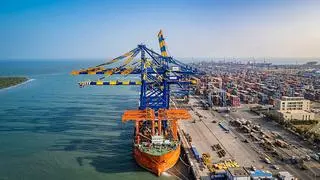State-owned Chennai Port Trust is weighing a plan to roll out a special voluntary retirement scheme for employees, its seventh since 1992, as it looks to cut transaction costs and stay fit in the face of competition from private, mechanised ports in the hinterland.
The board of trustees of Chennai Port Trust will consider the special voluntary retirement scheme this week, a Shipping Ministry official said.
The port trust currently has 3,846 employees on its rolls and the SVRS is aimed at Class 3 and 4 workers totalling 3,646 who have completed ten years of service or attained 40 years.
Employees opting for the SVRS will get one month emoluments (Basic plus DA) for each completed year of service or 15 days emoluments (Basic plus DA) for each month of remaining service, whichever is lower, subject to a ceiling of ₹15 lakh.
The employees opting for the SVRS will also get normal benefits such as the balance in the provident fund account, cash equivalent of accumulated earned leave as per Chennai Port Trust regulations, gratuity and pension according to Chennai Port Trust (Pension) Regulations.
For employees who have joined service on or after January 1, 2004, the accrued benefits and pension will be paid by the Pension Fund Regulatory and Development Authority (PFRDA).
Since 1992 when the first SVRS was introduced, the port trust has laid off 4,354 employees.
Huge competition
The port trust is facing severe competition from Kattupalli and Krishnapatnam ports run by the Adani Group. The hinterland that was exclusive to Chennai for many years is now being shared by five ports, eating into its volumes and hurting growth.
Chennai Port Trust handled 46.759 million tonnes (mt) of cargo in FY20 from 53.012 mt in FY19, a decline of 11.8 per cent.
In March, Chennai Port Trust acquired the Central government’s 67 per cent stake in Kamarajar Port Ltd for ₹2,383 crore, bulk of which was funded through a loan from the State Bank of India (SBI).
The acquisition gives financially-stressed Chennai with huge pension liabilities, dividend from Kamarajar on the entire 100 per cent stake. But, more importantly, it would help Chennai “manage” competition by avoiding duplication of capacity creation.
It is also expected to foster better human resource management between the two ports, thereby increasing the efficiency of both ports. Kamarajar has a staff strength of less than 100.







Comments
Comments have to be in English, and in full sentences. They cannot be abusive or personal. Please abide by our community guidelines for posting your comments.
We have migrated to a new commenting platform. If you are already a registered user of TheHindu Businessline and logged in, you may continue to engage with our articles. If you do not have an account please register and login to post comments. Users can access their older comments by logging into their accounts on Vuukle.